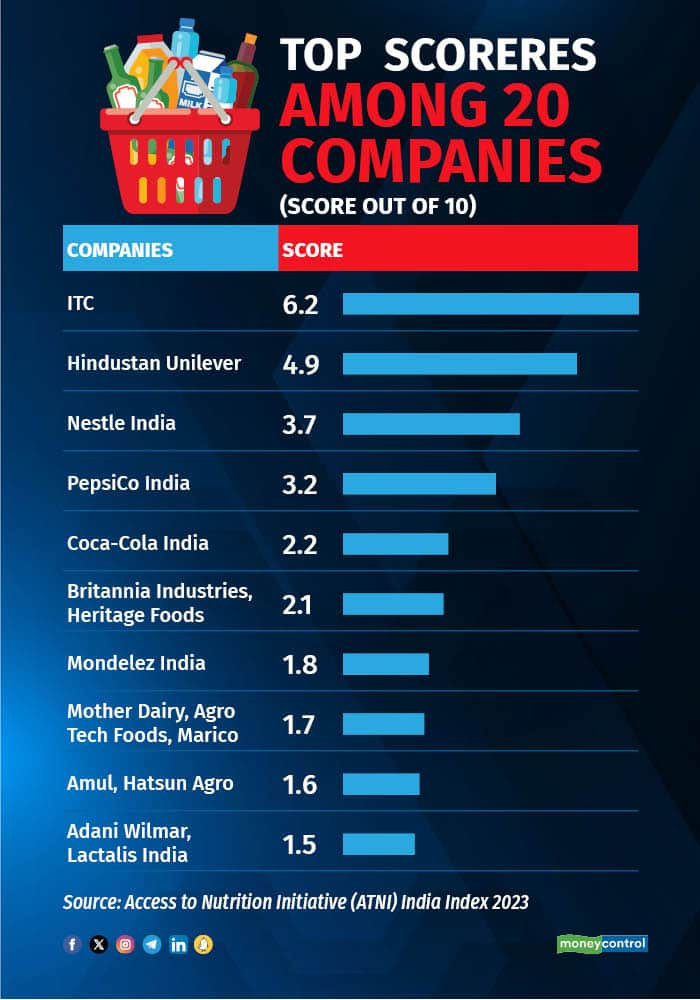



Despite growing awareness and a trend towards healthier lifestyles, a vast majority of Indian consumers continue to buy packaged food products that are deemed unhealthy. So much so that this category accounts for a third of total packaged foods revenue.
According to a report by Access to Nutrition Initiative (ATNI), a global not-for-profit organisation backed by the World Health Organisation (WHO) and the Gates Foundation among others, of 1,901 products currently being sold by top 20 food companies in India, only 24 percent qualify as "healthier" products. These firms collectively represent 36 percent of the overall sales in the processed packaged foods sector in India.
ATNI's index methodology assessed companies using 58 indicators across seven categories, providing a comprehensive evaluation. The categories include product profile, governance, accessibility, marketing, workforce nutrition, labelling and policy engagement. In terms of “healthiness” scores among Indian companies, ITC emerged as the leader, followed by Hindustan Unilever, Nestlé India, PepsiCo India and Coca-Cola India.
 A 'healthy product' is one that scores 3.5 or more out of 5 on a 'health star rating' model that rewards higher levels of fruits, vegetables and fibre, and penalizes higher sodium, saturated fat, and sugar content.
A 'healthy product' is one that scores 3.5 or more out of 5 on a 'health star rating' model that rewards higher levels of fruits, vegetables and fibre, and penalizes higher sodium, saturated fat, and sugar content.However, the overall healthiness of companies' products presents a concerning picture. The mean healthiness score was found to be 1.9 stars out of 5.0, consistent with the 2020 figures. Notably, substantial variation exists among companies, with over half (55.6 percent) of all products scoring 1.5 out of 5 stars or below. The report also highlighted that 12 percent of products were eligible for marketing to children, based on the WHO South-East Region criteria.
To conduct this evaluation, the index used the internationally recognised Health Star Rating (HSR) nutrient profiling model, endorsed by various governments. Products scoring 3.5 stars or more out of 5 in the HSR can be confidently promoted as healthier choices in public settings, according to ATNI's findings.
“This India index will serve as a powerful catalyst for driving positive change within the food and beverage industry in India. By focusing on private sector contributions to diet, nutrition and health, the index sheds light on what is working and what is not among the food industry.” said Greg S Garrett, executive director, ATNI.
This insight comes from a deeper dive into the efforts of seven out of the 20 indexed companies currently undertaking transformative journeys, aligning (re)formulation targets with dietary guidelines for sodium, saturated fat, and sugar.
Hindustan Unilever, ITC and PepsiCo India distinguish themselves by establishing targets to decrease salt, sugar and saturated fat in their products. Additionally, Hindustan Unilever and ITC have set goals to boost beneficial ingredients like fruits, vegetables and whole grains in relevant product categories, the report added.
Despite these initiatives, the study brings attention to a notable challenge—the absence of a universally agreed-upon definition of what qualifies as healthy food. Companies, it seems, are left to rely on their own interpretations, which may not align with each other or with internationally-recognised standards. The intricacies of defining and measuring healthiness in food products add a layer of complexity to the industry's journey toward offering healthier options to consumers.
Discover the latest Business News, Sensex, and Nifty updates. Obtain Personal Finance insights, tax queries, and expert opinions on Moneycontrol or download the Moneycontrol App to stay updated!
Find the best of Al News in one place, specially curated for you every weekend.
Stay on top of the latest tech trends and biggest startup news.